 Tìm kiếm
Tìm kiếm
Chương XV Luật Thi hành án hình sự 2019: Nhiệm vụ, quyền hạn của cơ quan nhà nước trong quản lý công tác thi hành án hình sự
| Số hiệu: | 41/2019/QH14 | Loại văn bản: | Luật |
| Nơi ban hành: | Quốc hội | Người ký: | Nguyễn Thị Kim Ngân |
| Ngày ban hành: | 14/06/2019 | Ngày hiệu lực: | 01/01/2020 |
| Ngày công báo: | 21/07/2019 | Số công báo: | Từ số 575 đến số 576 |
| Lĩnh vực: | Trách nhiệm hình sự | Tình trạng: | Còn hiệu lực |
TÓM TẮT VĂN BẢN
Phạm nhân đồng tính, chuyển giới được bố trí giam giữ riêng
Đây là nội dung nổi bật trong Luật Thi hành án hình sự 2019 được Quốc hội khóa XIV thông qua ngày 14/6/2019.
Theo đó, những phạm nhân đồng tính, chuyển đổi giới tính, hoặc chưa xác định rõ giới tính có thể được bố trí giam giữ riêng.
Ngoài ra, việc giam giữ phạm nhân được thực hiện như sau:
- Căn cứ vào tính chất của tội phạm, mức hình phạt, đặc điểm nhân thân thì Giám thị trại giam sẽ quyết định phân loại, chuyển khu giam giữ; phạm nhân được chia thành các đội, tổ để lao động, học tập và sinh hoạt.
- Trong thời gian chấp hành án phạt tù, phạm nhân được nhận xét, đánh giá kết quả chấp hành án phạt theo tuần, tháng, quý, 06 tháng và 01 năm; đảm bảo tính liên tục, khách quan, công bằng, công khai, dân chủ.
- Phạm nhân được phép nhận quà là tiền, đồ vật do thân nhân gửi qua đường bưu chính, nhưng không được quá 02 lần trong 01 tháng.
Luật Thi hành án hình sự 2019 có hiệu lực từ ngày 01/01/2020.
Văn bản tiếng việt
Văn bản tiếng anh
1. Thống nhất quản lý nhà nước về thi hành án hình sự trong phạm vi cả nước.
2. Chỉ đạo các cơ quan của Chính phủ, Ủy ban nhân dân cấp tỉnh trong thi hành án hình sự.
3. Phối hợp với Tòa án nhân dân tối cao, Viện kiểm sát nhân dân tối cao trong thi hành án hình sự.
4. Hằng năm, báo cáo Quốc hội về công tác thi hành án hình sự.
1. Bộ Công an chịu trách nhiệm trước Chính phủ thực hiện thống nhất quản lý nhà nước về thi hành án hình sự và có nhiệm vụ, quyền hạn sau đây:
a) Ban hành hoặc trình cơ quan có thẩm quyền ban hành văn bản quy phạm pháp luật về thi hành án hình sự; phối hợp với Tòa án nhân dân tối cao, Viện kiểm sát nhân dân tối cao, cơ quan khác có liên quan trong việc ban hành thông tư liên tịch quy định về việc phối hợp giữa các cơ quan này trong việc thực hiện trình tự, thủ tục thi hành án hình sự;
b) Xây dựng và tổ chức thực hiện chính sách, kế hoạch về thi hành án hình sự; chỉ đạo và tổ chức thực hiện các văn bản quy phạm pháp luật về thi hành án hình sự;
c) Đình chỉ, bãi bỏ theo thẩm quyền hoặc kiến nghị cấp có thẩm quyền bãi bỏ những quy định về thi hành án hình sự trái với quy định của Luật này;
d) Ban hành các biểu mẫu, giấy tờ, sổ sách về thi hành án hình sự;
đ) Phổ biến, giáo dục pháp luật về thi hành án hình sự;
e) Quản lý hệ thống tổ chức, biên chế và hoạt động của cơ quan thi hành án hình sự trong Công an nhân dân; quyết định thành lập, sáp nhập, giải thể cơ quan thi hành án hình sự trong Công an nhân dân theo quy định của Luật này; đào tạo, bồi dưỡng, huấn luyện sĩ quan, hạ sĩ quan, chiến sĩ, công nhân Công an trong thi hành án hình sự; bồi dưỡng, huấn luyện, chỉ đạo, hướng dẫn nghiệp vụ cho cán bộ, công chức, nhân viên cơ quan, tổ chức được giao một số nhiệm vụ thi hành án hình sự;
g) Chỉ đạo việc truy bắt người chấp hành án bỏ trốn; áp giải người có quyết định thi hành án hình sự để thi hành án; giải tán, tạm giữ người có hành vi cản trở, chống đối việc thi hành án; phối hợp với đơn vị vũ trang nhân dân khác và chính quyền địa phương để chủ động triển khai lực lượng hỗ trợ thi hành án hình sự trong trường hợp cần thiết; thực hiện nhiệm vụ, quyền hạn khác theo quy định của Luật này;
h) Kiểm tra, thanh tra, khen thưởng, xử lý vi phạm trong công tác thi hành án hình sự; giải quyết khiếu nại, tố cáo về thi hành án hình sự theo quy định của Luật này;
i) Quyết định kế hoạch phân bổ kinh phí, bảo đảm điều kiện cho hoạt động của cơ quan thi hành án hình sự;
k) Hợp tác quốc tế trong lĩnh vực thi hành án hình sự;
l) Tổng kết công tác thi hành án hình sự;
m) Ban hành và thực hiện chế độ thống kê về thi hành án hình sự;
n) Báo cáo Chính phủ về công tác thi hành án hình sự.
2. Bộ trưởng Bộ Công an căn cứ yêu cầu quản lý người bị tạm giữ, tạm giam để quyết định đưa người chấp hành án phạt tù có thời hạn từ 05 năm trở xuống không phải là người dưới 18 tuổi, người nước ngoài, người mắc bệnh truyền nhiễm nguy hiểm hoặc nghiện ma túy để phục vụ việc tạm giữ, tạm giam. Số lượng người chấp hành án phạt tù phục vụ việc tạm giữ, tạm giam được tính theo tỷ lệ trên tổng số người bị tạm giữ, tạm giam nhưng không vượt quá 15%.
1. Bộ Quốc phòng chịu trách nhiệm quản lý công tác thi hành án hình sự trong Quân đội nhân dân có nhiệm vụ, quyền hạn sau đây:
a) Ban hành hoặc trình cấp có thẩm quyền ban hành văn bản quy phạm pháp luật về thi hành án hình sự trong Quân đội nhân dân; phối hợp với Tòa án nhân dân tối cao, Viện kiểm sát nhân dân tối cao, cơ quan khác có liên quan trong việc ban hành thông tư liên tịch quy định về việc phối hợp giữa các cơ quan này trong việc thực hiện trình tự, thủ tục thi hành án hình sự;
b) Quản lý hệ thống tổ chức, biên chế và hoạt động của cơ quan thi hành án hình sự trong Quân đội nhân dân; quyết định thành lập, sáp nhập, giải thể cơ quan thi hành án hình sự trong Quân đội nhân dân theo quy định của Luật này;
c) Phối hợp với Bộ Công an, Bộ Giáo dục và Đào tạo, Bộ Tư pháp trong việc xây dựng chương trình giáo dục pháp luật, giáo dục công dân; phối hợp với Bộ Công an trong việc tổng kết, thống kê, báo cáo Chính phủ về công tác thi hành án hình sự;
d) Hướng dẫn, chỉ đạo nghiệp vụ thi hành án hình sự cho cơ quan thi hành án hình sự cấp quân khu; phổ biến, giáo dục pháp luật về thi hành án hình sự trong Quân đội nhân dân;
đ) Khen thưởng, kỷ luật đối với quân nhân làm công tác thi hành án hình sự trong Quân đội nhân dân;
e) Chỉ đạo việc truy bắt người chấp hành án bỏ trốn; áp giải người có quyết định thi hành án hình sự để thi hành án; giải tán, tạm giữ người có hành vi cản trở, chống đối việc thi hành án; phối hợp với đơn vị vũ trang nhân dân khác và chính quyền địa phương để chủ động triển khai lực lượng hỗ trợ thi hành án hình sự trong trường hợp cần thiết; thực hiện nhiệm vụ, quyền hạn khác theo quy định của Luật này;
g) Kiểm tra, thanh tra, giải quyết khiếu nại, tố cáo, xử lý vi phạm về thi hành án hình sự trong Quân đội nhân dân theo quy định của Luật này;
h) Quản lý, lập kế hoạch phân bổ kinh phí, bảo đảm cơ sở vật chất, phương tiện hoạt động thi hành án hình sự trong Quân đội nhân dân.
2. Bộ trưởng Bộ Quốc phòng căn cứ yêu cầu quản lý người bị tạm giữ, tạm giam trong các cơ sở giam giữ của Bộ Quốc phòng để quyết định đưa người chấp hành án phạt tù có thời hạn từ 5 năm trở xuống không phải là người dưới 18 tuổi, người nước ngoài, người mắc bệnh truyền nhiễm nguy hiểm hoặc nghiện ma túy để phục vụ việc tạm giữ, tạm giam. Số lượng người chấp hành án phạt tù tại trại tạm giam được tính theo tỷ lệ trên tổng số người bị tạm giữ, tạm giam nhưng không vượt quá 15%.
1. Phối hợp với Viện kiểm sát nhân dân tối cao, Bộ Công an, Bộ Quốc phòng, Bộ Tư pháp, cơ quan khác có liên quan trong việc ban hành thông tư liên tịch quy định về việc phối hợp giữa các cơ quan này trong việc thực hiện trình tự, thủ tục thi hành án hình sự.
2. Hướng dẫn Tòa án các cấp trong việc ra quyết định thi hành án hình sự; chỉ đạo Tòa án các cấp phối hợp với cơ quan quy định tại các khoản 1, 2 và 3 Điều 11 của Luật này trong công tác thi hành án hình sự.
3. Phối hợp với Bộ Công an, Bộ Quốc phòng trong việc tổng kết công tác thi hành án hình sự.
4. Phối hợp với Bộ Công an trong việc thực hiện chế độ thống kê, báo cáo về công tác thi hành án hình sự.
1. Phối hợp với Tòa án nhân dân tối cao, Bộ Công an, Bộ Quốc phòng, Bộ Tư pháp, cơ quan khác có liên quan trong việc ban hành thông tư liên tịch quy định về việc phối hợp giữa các cơ quan này trong việc thực hiện trình tự, thủ tục thi hành án hình sự.
2. Kiểm sát và chỉ đạo Viện kiểm sát các cấp thực hiện việc kiểm sát thi hành án hình sự theo quy định của Luật này và quy định khác của pháp luật có liên quan.
3. Phối hợp với Bộ Công an, Bộ Quốc phòng trong việc tổng kết công tác thi hành án hình sự.
4. Phối hợp với Bộ Công an trong việc thực hiện chế độ thống kê, báo cáo về công tác thi hành án hình sự.
1. Phối hợp với Tòa án nhân dân tối cao, Viện kiểm sát nhân dân tối cao, Bộ Công an, Bộ Quốc phòng, cơ quan khác có liên quan ban hành thông tư liên tịch quy định về việc phối hợp giữa các cơ quan này trong việc thực hiện trình tự, thủ tục thi hành án hình sự.
2. Phối hợp với Bộ Giáo dục và Đào tạo, Bộ Công an, Bộ Quốc phòng trong việc xây dựng chương trình giáo dục pháp luật, giáo dục công dân; phổ biến, giáo dục pháp luật về thi hành án hình sự.
3. Chỉ đạo cơ quan thi hành án dân sự chủ trì, phối hợp với trại giam, trại tạm giam, cơ quan thi hành án hình sự Công an cấp tỉnh, cơ quan thi hành án hình sự Công an cấp huyện, cơ quan thi hành án hình sự cấp quân khu trong việc cung cấp thông tin, chuyển giao giấy tờ, tiền, tài sản, việc thu, nộp tiền, tài sản có liên quan đến phạm nhân là người phải thi hành án dân sự, người được thi hành án dân sự; phối hợp với cơ quan thi hành án hình sự và cơ quan có liên quan trong thi hành án đối với pháp nhân thương mại.
Phối hợp với Bộ Công an, Bộ Quốc phòng trong việc chỉ đạo, hướng dẫn việc phòng, chống dịch bệnh, khám bệnh, chữa bệnh cho phạm nhân, học sinh trường giáo dưỡng; chỉ đạo công tác giám định theo thẩm quyền; tổ chức các cơ sở chuyên khoa y tế để thực hiện biện pháp tư pháp bắt buộc chữa bệnh theo quy định của Luật này.
1. Phối hợp với Bộ Công an trong chỉ đạo, hướng dẫn việc tổ chức lao động, dạy nghề và thực hiện chế độ, chính sách cho phạm nhân, học sinh trường giáo dưỡng.
2. Chỉ đạo cơ quan chuyên môn về lao động, thương binh và xã hội thuộc Ủy ban nhân dân cấp tỉnh và các cơ sở bảo trợ xã hội tiếp nhận, chăm sóc, nuôi dưỡng trẻ em là con phạm nhân không có người thân nhận chăm sóc, nuôi dưỡng theo quy định của Luật này và quy định khác của pháp luật có liên quan.
Phối hợp với Bộ Công an, Bộ Quốc phòng chỉ đạo, hướng dẫn việc xây dựng chương trình, tài liệu, đào tạo giáo viên, tham gia dạy văn hóa cho phạm nhân, học sinh trường giáo dưỡng theo quy định của Luật này và quy định khác của pháp luật có liên quan.
Bộ, cơ quan ngang Bộ, trong phạm vi chức năng, nhiệm vụ của mình, có trách nhiệm phối hợp với Bộ Công an, Bộ Quốc phòng trong thi hành án hình sự.
1. Chỉ đạo việc tổ chức phối hợp với các cơ quan có liên quan, Ủy ban nhân dân cấp dưới trong công tác thi hành án hình sự trên địa bàn theo quy định của Luật này và quy định khác của pháp luật có liên quan.
2. Chỉ đạo cơ quan chuyên môn, Ủy ban nhân dân cấp dưới và có chính sách phù hợp để khuyến khích cơ quan, tổ chức, cá nhân trong việc tạo điều kiện để người chấp hành xong án phạt tù, người được đặc xá, người được tha tù trước thời hạn có điều kiện tìm việc làm, ổn định cuộc sống, học nghề, hòa nhập cộng đồng.
3. Yêu cầu Công an cấp tỉnh báo cáo công tác thi hành án hình sự ở địa phương.
1. Chỉ đạo việc tổ chức phối hợp với các cơ quan có liên quan, Ủy ban nhân dân cấp xã trong giám sát, giáo dục người được hưởng án treo, người chấp hành án phạt cải tạo không giam giữ, cấm cư trú, cấm đảm nhiệm chức vụ, cấm hành nghề hoặc làm công việc nhất định, tước một số quyền công dân; quản lý người được hoãn, tạm đình chỉ chấp hành án phạt tù, người được tha tù trước thời hạn có điều kiện; kiểm soát, giáo dục người chấp hành án phạt quản chế theo quy định của Luật này và quy định khác của pháp luật có liên quan.
2. Chỉ đạo cơ quan chuyên môn, Ủy ban nhân dân cấp xã và có chính sách phù hợp để khuyến khích cơ quan, tổ chức, cá nhân trong việc tạo điều kiện để người chấp hành xong án phạt tù, người được đặc xá, người được tha tù trước thời hạn có điều kiện tìm việc làm, ổn định cuộc sống, học nghề, hòa nhập cộng đồng.
3. Yêu cầu Công an cấp huyện báo cáo công tác thi hành án hình sự ở địa phương.
TASKS AND POWERS OF STATE AGENCTES IN THE MANAGEMENT OF CRIMINAL JUDGMENT EXECUTION
Article 194. Tasks and powers of the Government in the state management of criminal judgment execution
1. Perform consistent state management of criminal judgment execution nationwide.
2. Direct its affiliated agencies and provincial-level People's Committees in executing criminal judgments.
3. Cooperate with the Supreme People's Court and the Supreme People's Procuracy in executing criminal judgments.
4. Annually report on criminal judgment execution to the National Assembly .
Article 195. Tasks and powers of the Ministry of Public Security in the management of criminal judgment execution
1. The Ministry of Public Security is answerable to the Government for performing the consistent state management of criminal judgment execution and has the following tasks and powers:
a) Promulgate or submit to competent agencies for promulgation legal documents on execution of criminal judgments; cooperate with the Supreme People’s Court, the Supreme People’s Procuracy, other relevant agencies in promulgating joint circulars on cooperation between these agencies in carrying out procedures for criminal judgment execution;
b) Formulate, and organize the implementation of policies and plans on criminal judgment execution; direct and organize the implementation of legal documents on execution of criminal judgments;
c) Suspend or annul according to its competence or propose competent authorities to annul regulations on execution of criminal judgments which are contract to this Law;
d) Promulgate forms, papers and books on criminal judgment execution;
dd) Disseminate and educate about the law on execution of criminal judgments;
e) Manage the organizational system, payrolls and operation of criminal judgment execution agencies in the People's Public Security Force under this Law; decide the establishment, acquisition, dissolution of criminal judgment execution agencies in the People's Public Security under this Law; train and retrain officers, noncommissioned officers, soldiers, workers and public employees of the People's Public Security in criminal judgment execution; train, retrain, direct and professionally guide cadres, civil servants and staff members of agencies and organizations assigned to perform some tasks of criminal judgment execution;
g) Direct the pursuit of escaped sentenced persons; escort persons against whom decisions to execute criminal judgments have been issued for judgment execution; dismiss or hold in custody persons who commit acts of obstructing or opposing judgment execution; cooperate with other people's armed force units and local administrations in proactively deploying forces to support the execution of criminal judgments when necessary; perform other tasks and exercise other powers under this Law;
h) Examine, inspect, commend, reward, and handle violations in the criminal judgment execution; settle complaints and denunciations about criminal judgment execution under this Law;
i) Decide plans on allocation of funds and guarantee of conditions for operations of criminal judgment execution agencies;
k) Conduct international cooperation on criminal judgment execution;
l) Review the work of criminal judgment execution;
m) Promulgate and implement regulations on making of statistics on criminal judgment execution;
n) Report on criminal judgment execution to the Government.
2. The Minister of Public Security shall base him/herself on requirements of the management of persons held in detention or custody to decide to employ persons serving prison sentences of 5 years or less who are not minors, foreigners or drug addicts and suffer no dangerously infectious disease in detention or custody work. The number of persons serving prison sentences who are employed in detention or custody work shall be calculated at a certain percentage of the total number of persons held in detention or custody but must not exceed 15%.
Article 196. Tasks and powers of the Ministry of National Defense in the management of criminal judgment execution
1. The Ministry of National Defense is responsible for managing the criminal judgment execution in the People's Army and has the following tasks and powers:
a) Promulgate or submit to competent agencies for promulgation legal documents on execution of criminal judgments in people's army; cooperate with the Supreme People’s Court, the Supreme People’s Procuracy, other relevant agencies in promulgating joint circulars on cooperation between these agencies in carrying out procedures for criminal judgment execution;
b) Manage the organizational system, payrolls and operation of criminal judgment execution agencies in the people's army; decide the establishment, acquisition, dissolution of criminal judgment execution agencies in the people's army as per this Law;
c) Cooperate with the Ministry of Public Security, the Ministry of Education and Training and the Ministry of Justice in elaborating programs on law education and civil education; cooperate with the Ministry of Public Security in reviewing, making statistics and reporting on criminal judgment execution to the Government;
d) Provide professional guidance and directions on execution of criminal judgments to military zone-level criminal judgment execution agencies; to disseminate and educate about the law on execution of criminal judgments in the people's army;
dd) Commend, reward or discipline army-men engaged in the execution of criminal judgments in the people's army;
e) Direct the pursuit of escaped sentenced persons; escort persons against whom decisions to execute criminal judgments have been issued for judgment execution; dismiss or hold in custody persons who commit acts of obstructing or opposing judgment execution; cooperate with other people's armed force units and local administrations in proactively deploying forces to support the execution of criminal judgments when necessary; perform other tasks and exercise other powers under this Law;
g) Examine, inspect, and settle complaints and denunciations and handle violations about execution of criminal judgments in the people's army under this Law;
h) Manage and make plans on allocation of funds and guarantee of facilities and means for criminal judgment execution activities in the people’s army.
2. The Minister of National Defense shall base him/herself on requirements of the management of persons held in detention or custody to decide to employ persons serving prison sentences of 5 years or less who are not minors, foreigners or drug addicts and suffer no dangerously infectious diseases in detention or custody work. The number of persons serving prison sentences who are employed in detention or custody work shall be calculated at a certain percentage of the total number of persons held in detention or custody but must not exceed 15%.
Article 197. Tasks and powers of the Supreme People's Court in criminal judgment execution
1. Cooperate with the Supreme People’s Procuracy, the Ministry of Public Security, the Ministry of National Defense, the Ministry of Justice and other concerned agencies in promulgating joint circulars on cooperation between these agencies in carrying out procedures for criminal judgment execution.
2. Guide courts at all levels in issuing criminal judgment execution decisions; cooperate with agencies and organizations defined in Clauses 1, 2 and 3, Article 11 of this Law in the execution of criminal judgments.
3. Cooperate with the Ministry of Public Security and the Ministry of National Defense in reviewing the execution of criminal judgments.
4. Cooperate with the Ministry of Public Security in implementing regulations on statistics and reporting on criminal judgment execution.
Article 198. Tasks and powers of the Supreme People's Procuracy in criminal judgment execution
1. Cooperate with the Supreme People’s Court, the Ministry of Public Security, the Ministry of National Defense, the Ministry of Justice and other concerned agencies in promulgating joint circulars on cooperation between these agencies in carrying out procedures for criminal judgment execution.
2. Inspect and direct procuracies at all levels in inspecting the execution of criminal judgments under this Law and other relevant lawsoft.
3. Cooperate with the Ministry of Public Security and the Ministry of National Defense in reviewing the execution of criminal judgments.
4. Cooperate with the Ministry of Public Security in implementing regulations on statistics and reporting on criminal judgment execution.
Article 199. Tasks and powers of the Ministry of Justice in criminal judgment execution
1. Cooperate with the Supreme People’s Court, the Supreme People’s Procuracy, the Ministry of Public Security, the Ministry of National Defense, the Ministry of Justice and other concerned agencies in promulgating joint circulars on cooperation between these agencies in carrying out procedures for criminal judgment execution.
2. Cooperate with the Ministry of Education and Training, the Ministry of Public Security and the Ministry of National Defense in elaborating programs on law education and civic education and to disseminate and educate about the law on execution of criminal judgments.
3. Direct civil judgment execution agencies in coordinating with prisons, detention centers and criminal judgment execution agencies of provincial-level police departments, district-level police offices and military zones in providing information and handing over papers, money and assets, and collection and payment of money and assets related to inmates who are civil judgment debtor and judgment creditor; cooperate with criminal judgment execution agencies and relevant agencies in judgment execution of corporate legal entities.
Article 200. Tasks and powers of the Ministry of Health in criminal judgment execution
Cooperate with the Ministry of Public Security and the Ministry of National Defense in directing and guiding the disease and epidemic prevention and combat, providing medical examination and treatment for inmates and reformatory inmates; direct the assessment within their competence; and organize specialized medical establishments to execute the judicial measure of compulsory medical treatment under this Law.
Article 201. Tasks and powers of the Ministry of Labor War Invalids and Social Affairs in criminal judgment execution
1. Cooperate with the Ministry of Public Security in directing and guiding the organization of work, job training and implementation of regimes and policies for inmates and reformatory inmates.
2. Direct provincial-level Departments of Labor War Invalids and Social Affairs and social protection establishments in receiving, caring for and nurturing children of inmates who have no relatives wanting to care for and nurture them under this Law and other relevant laws.
Article 202. Tasks and powers of the Ministry of Education and Training in criminal judgment execution
Cooperate with the Ministry of Public Security, the Ministry of National Defense in directing and guiding the elaboration of programs and materials, training teachers and participating in providing general education for inmates and reformatory inmates under this Law and other relevant laws.
Article 203. Tasks and powers of ministries and ministerial-level agencies in criminal judgment execution
Ministries and ministerial-level agencies shall, within their functions and duties, cooperate with the Ministry of Public Security, the Ministry of National Defense in criminal judgment execution.
Article 204. Tasks and powers of district-level People's Committees in criminal judgment execution
1. Direct cooperation among concerned agencies and lower level People's Committees in executing the community sentence, additional penalties and suspended sentences under this Law and other relevant laws.
2. Direct specialized agencies and commune-level People's Committees in adopting and adopt appropriate policies to mobilize contributions and supports of agencies, organizations and enterprises in their localities to enable persons who have completely served their prison sentences to find jobs, stabilize their life, learn jobs and integrate themselves into the community.
3. Request provincial-level police departments to report on the execution of criminal judgments in their provinces.
Article 205. Tasks and powers of district-level People's Committees in criminal judgment execution
1. Direct cooperation among concerned agencies and People's Committees in supervising and educating persons serving suspended sentences, community sentences, prohibition from residence, prohibition from residence, prohibition from holding certain positions, practicing certain professions or performing certain jobs, deprivation of certain citizenship rights; supervision of persons whose sentence is postponed or suspended, parolees; supervision and education of persons subject to mandatory supervision under this Law and other relevant laws.
2. Direct specialized agencies and commune-level People's Committees in adopting and adopt appropriate policies to mobilize contributions and supports of agencies, organizations and enterprises in their localities to enable persons who have completely served their prison sentences to find jobs, stabilize their life, learn jobs and integrate themselves into the community.
3. Request district-level police departments to report on the execution of criminal judgments in their districts.
Văn bản liên quan
Cập nhật
Điều 71. Hủy quyết định tha tù trước thời hạn có điều kiện
Điều 80. Hồ sơ thi hành án tử hình
Điều 81. Hoãn thi hành án tử hình
Điều 84. Quyết định thi hành án treo
Điều 110. Thủ tục miễn chấp hành thời hạn cấm cư trú còn lại
Điều 117. Thủ tục miễn chấp hành thời hạn quản chế còn lại
Bài viết liên quan
Bị cách chức có được hưởng lương hưu không?
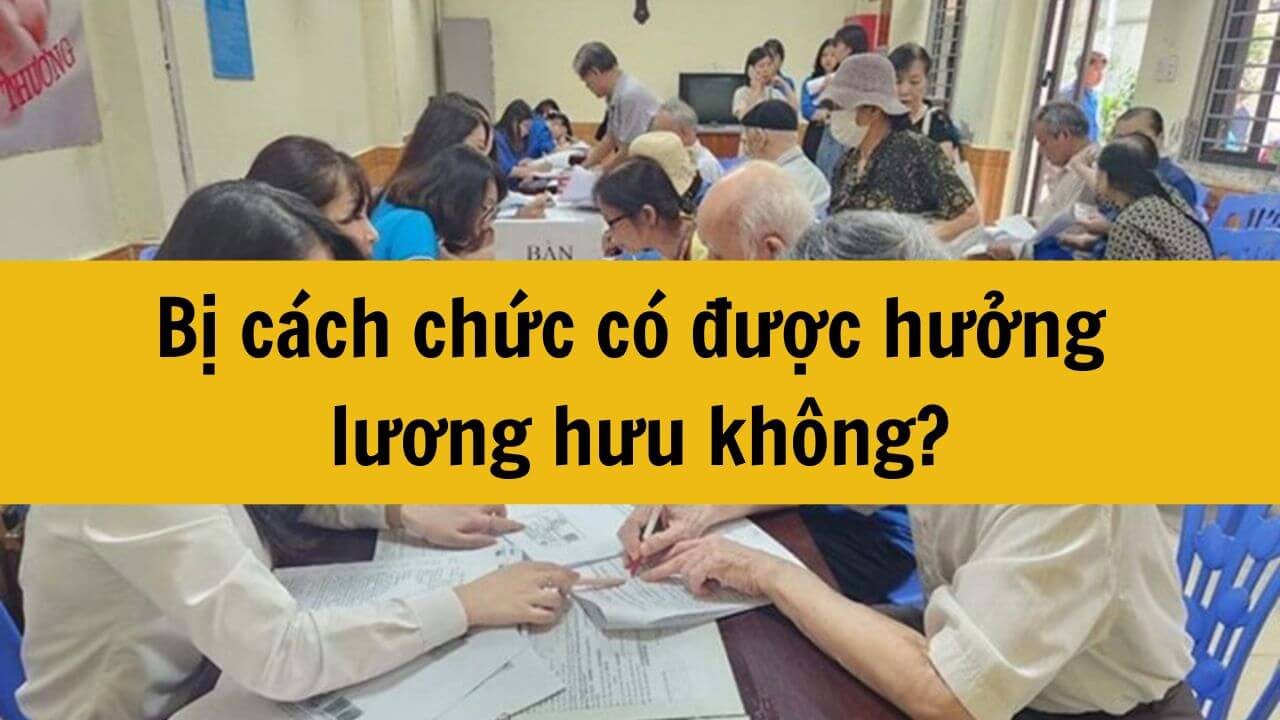
Bị cách chức có được hưởng lương hưu không?
Trong quá trình công tác, vì nhiều lý do khác nhau, một số cán bộ, công chức có thể bị cách chức hoặc kỷ luật. Một trong những câu hỏi thường gặp khi đó là liệu họ có còn được hưởng lương hưu sau khi nghỉ hưu hay không. Vấn đề này không chỉ ảnh hưởng đến quyền lợi cá nhân mà còn có tác động đến tài chính gia đình của người bị cách chức. Bài viết dưới đây sẽ giải đáp chi tiết về quy định pháp luật liên quan đến quyền lợi lương hưu trong trường hợp bị cách chức. 14/11/2024Bị khởi tố có được hưởng lương hưu không?

Bị khởi tố có được hưởng lương hưu không?
Khi một cá nhân bị khởi tố, nhiều vấn đề pháp lý và quyền lợi cá nhân sẽ phát sinh, trong đó có câu hỏi được nhiều người quan tâm. Liệu một người đang nhận lương hưu có tiếp tục được hưởng quyền lợi này khi bị khởi tố hay không? Đây là vấn đề không chỉ liên quan đến quyền lợi của người lao động sau khi nghỉ hưu mà còn ảnh hưởng đến gia đình và người thân của họ. Vậy hiện nay pháp luật quy định ra sao về vấn đề này. 14/11/2024Cán bộ, công chức đang đi tù có được hưởng lương hưu không?
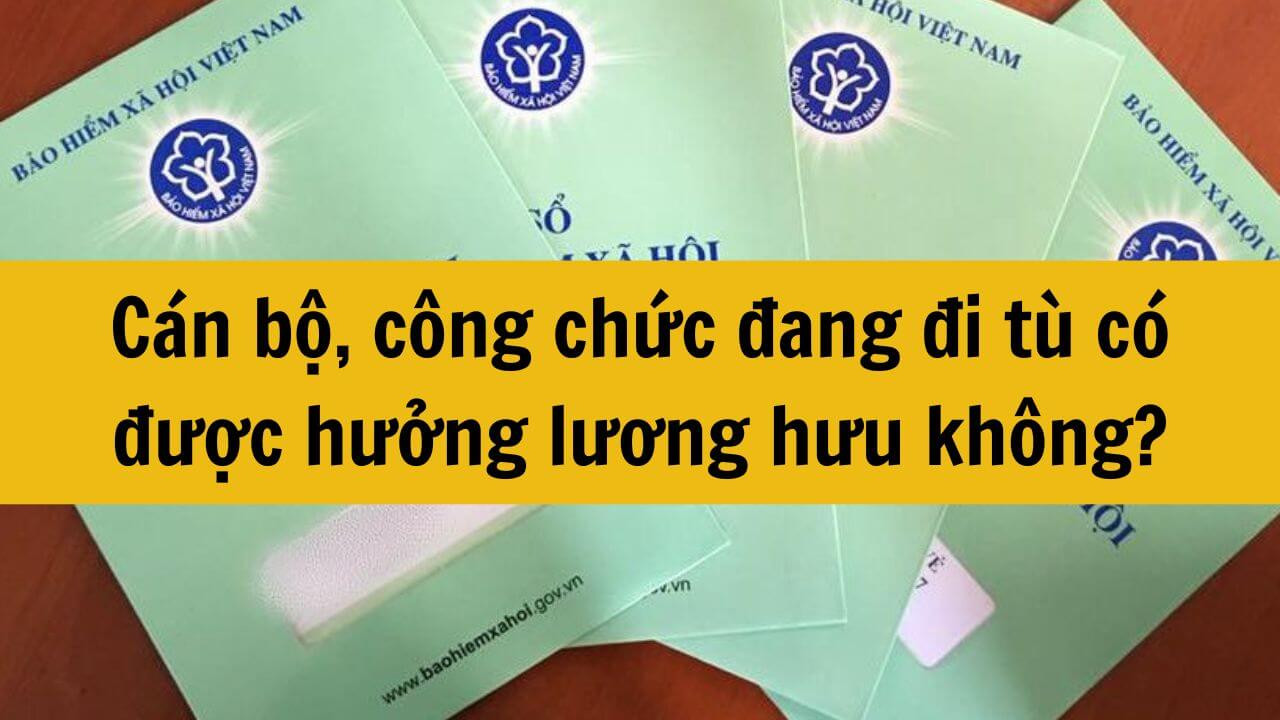
Cán bộ, công chức đang đi tù có được hưởng lương hưu không?
Khi cán bộ, công chức vi phạm pháp luật và phải thi hành án phạt tù, một câu hỏi đặt ra là liệu họ có tiếp tục được hưởng các quyền lợi về hưu trí, đặc biệt là lương hưu hay không. Đây là một vấn đề nhận được nhiều sự quan tâm, không chỉ vì quyền lợi cá nhân của người lao động mà còn ảnh hưởng đến ngân sách nhà nước và tính công bằng trong hệ thống an sinh xã hội. Vậy hiện nay, pháp luật có quy định ra sao về vấn đề này? 14/11/2024Mẫu hồ sơ mới nhất 2025 hưởng lương hưu đối với người lao động đang chấp hành hình phạt tù và hướng dẫn chi tiết
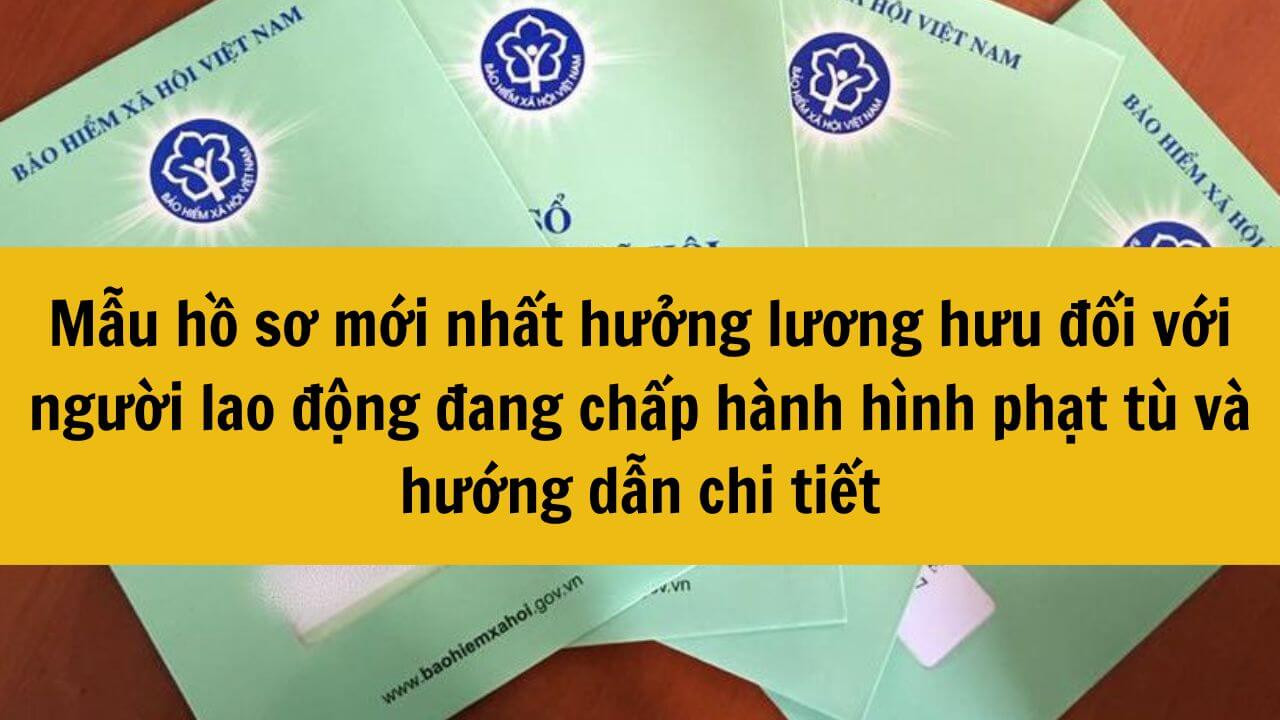
Mẫu hồ sơ mới nhất 2025 hưởng lương hưu đối với người lao động đang chấp hành hình phạt tù và hướng dẫn chi tiết
Trong bối cảnh nền kinh tế ngày càng phát triển, việc đảm bảo các quyền lợi cho mọi thành phần, kể cả những người lầm lỡ, trở nên ngày càng cần thiết. Một trong những vấn đề được nhiều người lao động quan tâm là việc những người bị kết án tù và phải đi tù có được hưởng lương hưu hay không, và nếu có thì cách thức nộp hồ sơ của họ như thế nào? Hãy cùng tìm hiểu sâu hơn về vấn đề này trong bài viết dưới đây. 14/11/2024Năm 2025 người lao động đi tù có được hưởng lương hưu không?
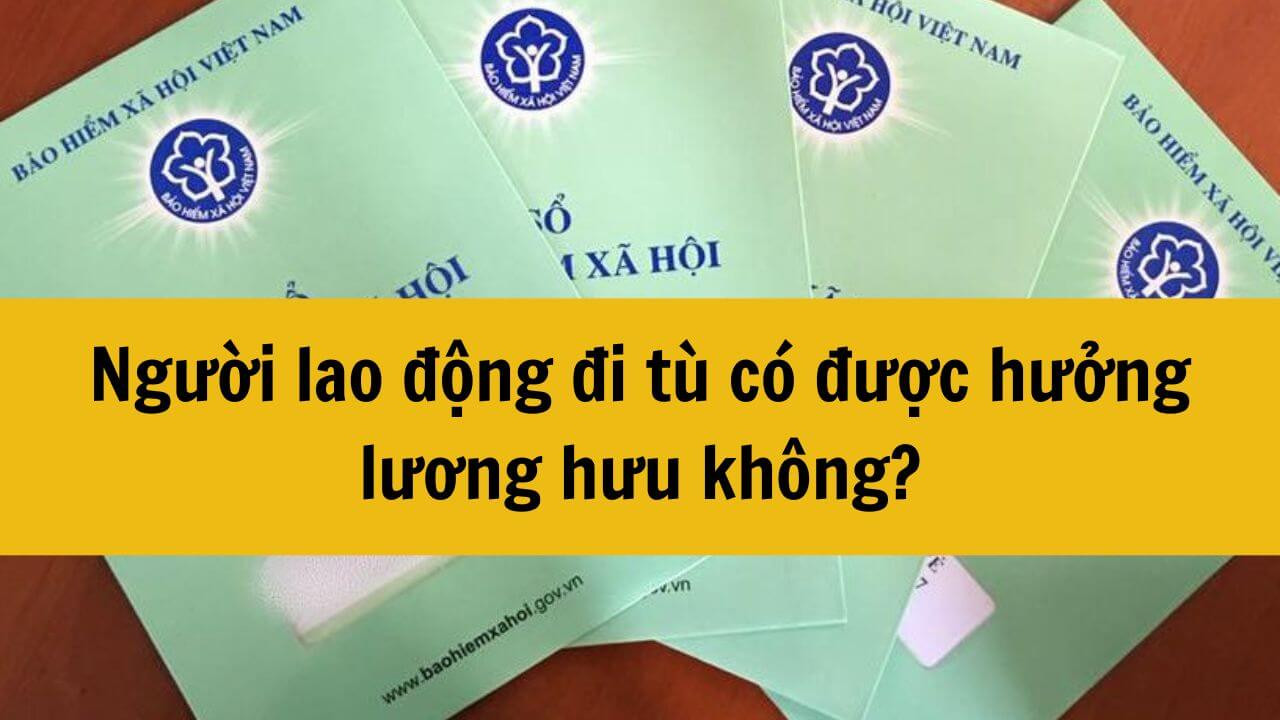
Năm 2025 người lao động đi tù có được hưởng lương hưu không?
Trong bối cảnh nền kinh tế ngày càng phát triển, việc đảm bảo các quyền lợi cho mọi thành phần, kể cả những người lầm lỡ, trở nên ngày càng cần thiết. Một trong những vấn đề được nhiều người lao động quan tâm là việc những người bị kết án tù và phải đi tù có được hưởng lương hưu hay không. Hãy cùng tìm hiểu sâu hơn về vấn đề này để có cái nhìn rõ ràng hơn về chính sách lương hưu và quyền lợi của người lao động trong năm 2025. 14/11/2024Hình phạt bổ sung đối với người được hưởng án treo
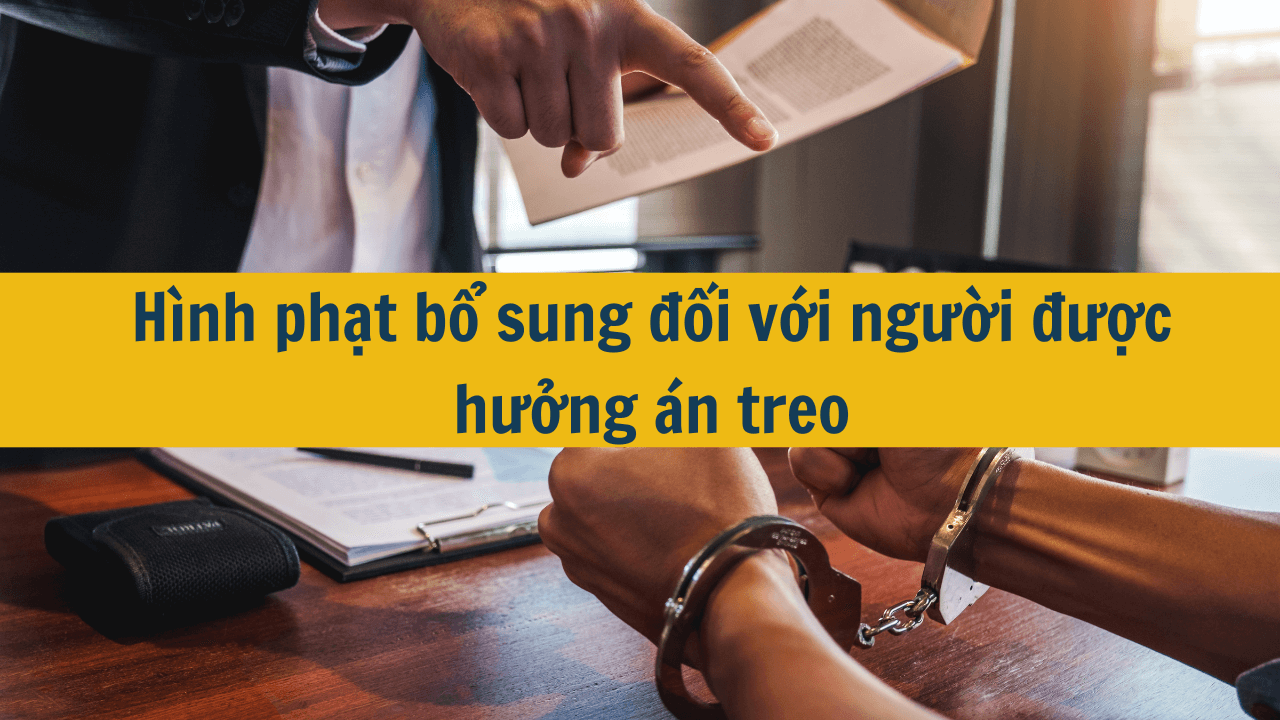
Hình phạt bổ sung đối với người được hưởng án treo
Tù treo hay án treo là biện pháp miễn chấp hành hình phạt tù có điều kiện, được Tòa án áp dụng đối với người phạm tội bị phạt tù không quá 03 năm, căn cứ vào nhân thân của người phạm tội và các tình tiết giảm nhẹ, xét thấy không cần bắt họ phải chấp hành hình phạt tù. Trong trường hợp phạt bổ sung thì quy định như thế nào? 10/11/2024Những ngành nghề cần có bằng cử nhân Luật

Những ngành nghề cần có bằng cử nhân Luật
Bằng cử nhân luật mở ra rất nhiều cơ hội nghề nghiệp đa dạng và hấp dẫn. Với kiến thức chuyên sâu về pháp luật, người tốt nghiệp ngành luật có thể lựa chọn làm việc tại nhiều lĩnh vực khác nhau. Dưới đây là một số ngành nghề phổ biến mà bạn có thể tham khảo. 06/11/2024Án treo là gì? Điều kiện hưởng án treo theo quy định pháp luật hiện hành


 Luật Thi hành án hình sự 2019 (Bản Word)
Luật Thi hành án hình sự 2019 (Bản Word)
 Luật Thi hành án hình sự 2019 (Bản Pdf)
Luật Thi hành án hình sự 2019 (Bản Pdf)